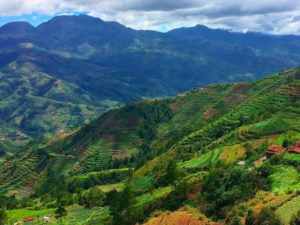Spirited Reflection: Coping with lockdown, quarantine, staying-at-home

A long-time partner of KAIROS in the Philippines, Vernie Yocogan-Diano, shared the following with us to keep up our spirits, to learn from the Igorot and to remind us all worldwide of the choices we face. In northern Philippines, the Igorot (a collective term for Indigenous peoples in the Cordillera mountain region) are composed of several ethnolinguistic groups, all of whom keep, or have kept until recently, their traditional religion and way of life.
In the Igorot culture, lockdown/quarantine/stay-at-home is ubaya and ngilin. Other tribes call it te-e/te-er,ngitngit or tengaw:
- A time to rest, pause from your routine and busy life, an act of reprieve, a let off, maybe a cleansing rite after a bad incident;
- is observed to signal a shift from one season to another;
- may be a ritual of thanksgiving for abundance and life.
Essentially, it’s a community holiday, a communal fellowship to reflect, contemplate and learn that is run by elders. The number of days depend on the incident it is being applied.
Elders (men) stay and hold rites with animal or fowls offered and sacrificed in the dap-ay or ato/ator. Women are around to attend to food and other needs. Villagers simply stay at home and prevented to go to the fields, forests and outside of the community. A pudong (knotted stick leaves) warns everyone not to cross over, the ili (village) is off-limits to visitors and outsiders. Home chores continue as normal activities. It may also be a time to weave cloth or baskets and make other handicrafts.
Each one from the young to the old, women and men is reminded on values of inayan and lawa (customary dont’s, avoidance of anything evil or violative of community values, care and solidarity). Ubaya, ngilin, ngitngit, te-e/te-er or tengaw are part of the solidarity, safety and care systems of Igorots. No one is left behind. It is part of life ways and done in service of the common good.
The reality however is Indigenous knowledge-practices are eroding, disintegrating at a rapid pace with the dominant rule of greed, individualism and apathy in the current social order at both the macro and micro-levels. Indigenous peoples are already being integrated with the wider world and are not living in isolation. But can positive Indigenous knowledge and practices be revived and reinforced? This must be an act of self-determination, a collective political will and action.
Vernie Yocogan-Diano is an Indigenous Igorot (Kankanaey-Bontoc) woman, human rights defender from northern Philippines, mother of two daughters and lover of Mother Earth. Insatiable in learning Indigenous wisdom and in building community solidarity. Thankful of a supportive husband and family circle and stubborn women and communities who keep building their courage and faith for the good and just to reign.
She is a long-time partner of the KAIROS Women of Courage program, an important voice in the gendered impacts of resource extraction work and has visited Canada a number of times, including as an international witness to the Truth and Reconciliation Commission of Canada national events.



